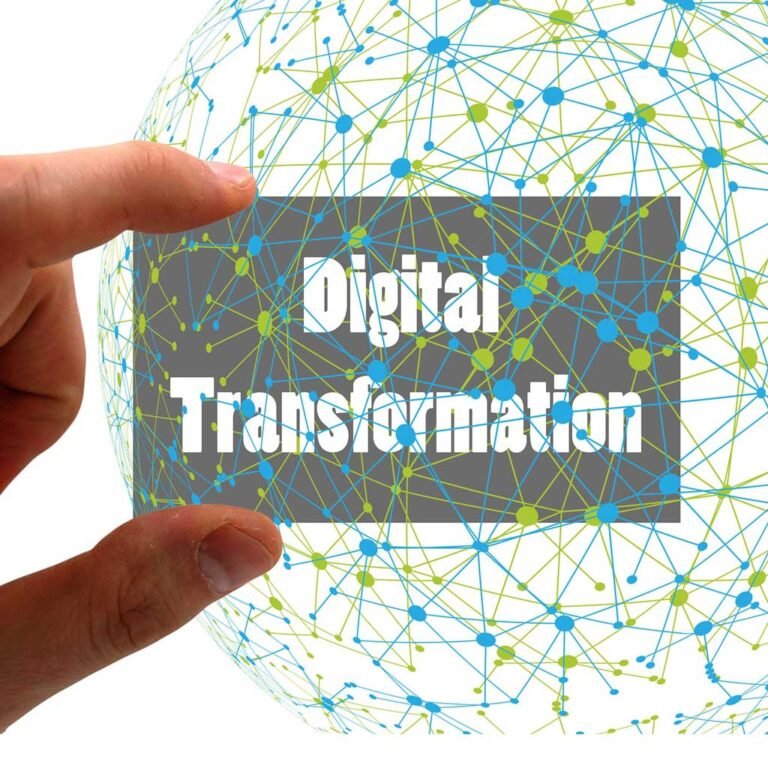
What is Digital Transformation?
Last updated: March 17, 2024 | Digital Techtune
Digital transformation has emerged as a crucial concept reshaping industries, organizations, and societies in the 21st century. This essay explores the multifaceted nature of digital transformation, elucidating its definitions, drivers, challenges, and opportunities. It discusses how digital technologies are revolutionizing business processes, enhancing customer experiences, and fostering innovation across various sectors. Additionally, it analyzes the implications of digital transformation for individuals, businesses, and society as a whole. Through a comprehensive examination, this essay aims to provide a nuanced understanding of digital transformation and its significance in the contemporary landscape.
Introduction
Definition and Scope
Drivers of Digital Transformation
1. Technological Advancements
2. Changing Consumer Expectations
3. Competitive Pressures
4. Regulatory Environment
Challenges of Digital Transformation
1. Legacy Systems and Infrastructure
2. Cultural Resistance
3. Talent Shortages
4. Data Privacy and Security Concerns
Opportunities of Digital Transformation
1. Enhanced Customer Experiences
2. Operational Efficiency
3. Innovation and Agility
4. Market Expansion and Global Reach
Implications of Digital Transformation
1. Socioeconomic Impact
2. Reskilling and Lifelong Learning
3. Ethical and Social Considerations
4. Environmental Sustainability
Introduction:
In an era characterized by rapid technological advancements, the term “digital transformation” has become ubiquitous across industries and sectors. From enterprises embracing cloud computing and big data analytics to governments leveraging digital platforms for citizen services, the impact of digitalization is pervasive. However, amidst the buzz surrounding this phenomenon, there exists a need for a clear understanding of what digital transformation entails, its underlying principles, and its implications for organizations and society at large. This essay endeavors to delve into these aspects, elucidating the concept of digital transformation in detail.
Definition and Scope:
Digital transformation can be defined as the strategic integration of digital technologies into all aspects of business operations, fundamentally altering how organizations deliver value to customers, optimize internal processes, and innovate in their respective domains. It encompasses a wide array of technologies, including but not limited to artificial intelligence, Internet of Things (IoT), cloud computing, data analytics, blockchain, and augmented reality. The scope of digital transformation extends beyond mere adoption of digital tools; it entails a holistic reimagining of business models, organizational structures, and customer interactions to stay competitive in an increasingly digital world.
Drivers of Digital Transformation:
Several interrelated factors drive digital transformation initiatives across industries:
Technological Advancements:
The exponential growth of digital technologies, coupled with declining costs and increasing accessibility, serves as a primary driver of digital transformation. Innovations such as AI, IoT, and blockchain offer unprecedented opportunities for organizations to enhance efficiency, optimize processes, and deliver personalized experiences to customers.
Changing Consumer Expectations:
In an age characterized by instant gratification and seamless experiences, consumers demand convenience, customization, and real-time interactions from businesses. Digital transformation enables organizations to meet these evolving consumer expectations by leveraging data-driven insights to deliver tailored products and services.
Competitive Pressures:
In today’s hypercompetitive business landscape, organizations face constant pressure to innovate and differentiate themselves from competitors. Digital transformation enables companies to gain a competitive edge by leveraging technology to streamline operations, drive innovation, and respond swiftly to market dynamics.
Regulatory Environment:
Regulatory mandates and compliance requirements often necessitate organizations to adopt digital solutions for data security, privacy, and transparency. Digital transformation initiatives help organizations navigate complex regulatory landscapes while ensuring compliance and minimizing risks.
Challenges of Digital Transformation:
Despite its numerous benefits, digital transformation initiatives are fraught with challenges:
Legacy Systems and Infrastructure:
Many organizations grapple with legacy systems and outdated infrastructure, which pose significant barriers to digital transformation. Integrating new technologies with legacy systems often requires substantial investments in time, resources, and expertise.
Cultural Resistance:
Cultural resistance within organizations can impede digital transformation efforts. Resistance to change, fear of job displacement, and lack of digital literacy among employees are common challenges that organizations must address to foster a culture of innovation and digital readiness.
Talent Shortages:
The rapid pace of technological change has led to a shortage of skilled professionals with expertise in emerging technologies such as AI, data analytics, and cybersecurity. Recruiting and retaining top talent poses a significant challenge for organizations seeking to drive digital transformation.
Data Privacy and Security Concerns:
With the proliferation of data-driven technologies, concerns surrounding data privacy, security, and ethical use have come to the forefront. Organizations must navigate complex regulatory frameworks and implement robust security measures to safeguard sensitive data and maintain consumer trust.
Opportunities of Digital Transformation:
Despite the challenges, digital transformation presents a plethora of opportunities for organizations to innovate, grow, and thrive:
Enhanced Customer Experiences: Digital transformation enables organizations to deliver seamless, personalized experiences to customers across various touchpoints. By leveraging data analytics and AI-driven insights, businesses can anticipate customer needs, tailor offerings, and foster long-term relationships.
Operational Efficiency: Digital technologies streamline business processes, automate routine tasks, and optimize resource allocation, leading to significant improvements in operational efficiency and cost savings. From supply chain management to customer service, digital transformation drives efficiency gains across the entire value chain.
Innovation and Agility: Digital transformation fosters a culture of innovation and agility within organizations, enabling them to experiment with new ideas, iterate rapidly, and respond swiftly to changing market dynamics. By embracing emerging technologies and leveraging digital platforms, companies can drive continuous innovation and stay ahead of the curve.
Market Expansion and Global Reach: Digitalization breaks down geographical barriers and facilitates market expansion on a global scale. Through e-commerce platforms, digital marketing strategies, and online marketplaces, organizations can reach new audiences, expand their customer base, and capitalize on untapped market opportunities.
Implications of Digital Transformation:
The implications of digital transformation extend beyond organizational boundaries, shaping societies, economies, and the future of work:
Socioeconomic Impact: Digital transformation has profound socioeconomic implications, influencing employment patterns, income distribution, and access to opportunities. While it creates new job roles and economic opportunities, it also exacerbates concerns surrounding job displacement, income inequality, and digital divide.
Reskilling and Lifelong Learning: The rapid pace of technological change necessitates continuous reskilling and upskilling of the workforce to remain relevant in the digital economy. Lifelong learning initiatives, training programs, and educational reforms are essential to equip individuals with the skills needed to thrive in the digital age.
Ethical and Social Considerations: As digital technologies become increasingly pervasive, ethical and social considerations gain prominence. Issues such as data privacy, algorithmic bias, digital inclusion, and responsible AI require careful attention and thoughtful regulation to ensure that digital transformation benefits society as a whole.
Environmental Sustainability: Digital transformation presents opportunities to enhance environmental sustainability by optimizing resource utilization, reducing carbon emissions, and promoting eco-friendly practices. From smart energy management systems to green supply chain initiatives, digital technologies can contribute to the transition towards a more sustainable future.
Conclusion:
Digital transformation represents a paradigm shift in how organizations operate, innovate, and create value in the 21st century. By harnessing the power of digital technologies, organizations can enhance customer experiences, drive operational efficiency, and foster innovation across various sectors. However, realizing the full potential of digital transformation requires addressing challenges such as legacy systems, cultural resistance, and talent shortages while embracing opportunities for enhanced competitiveness, agility, and market expansion. Moreover, digital transformation carries profound implications for individuals, businesses, and society at large, shaping the future of work, socioeconomic dynamics, and environmental sustainability. As organizations embark on their digital transformation journeys, it is imperative to adopt a strategic, holistic approach that balances technological innovation with ethical considerations and societal impact, ultimately paving the way for a digitally empowered future.

